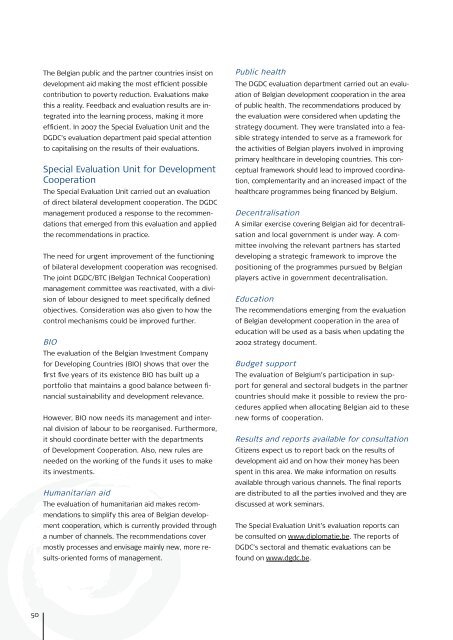2007 (PDF, 2.81 MB) - Belgium
2007 (PDF, 2.81 MB) - Belgium
2007 (PDF, 2.81 MB) - Belgium
Create successful ePaper yourself
Turn your PDF publications into a flip-book with our unique Google optimized e-Paper software.
The Belgian public and the partner countries insist on<br />
development aid making the most efficient possible<br />
contribution to poverty reduction. Evaluations make<br />
this a reality. Feedback and evaluation results are integrated<br />
into the learning process, making it more<br />
efficient. In <strong>2007</strong> the Special Evaluation Unit and the<br />
DGDC’s evaluation department paid special attention<br />
to capitalising on the results of their evaluations.<br />
Special Evaluation Unit for Development<br />
Cooperation<br />
The Special Evaluation Unit carried out an evaluation<br />
of direct bilateral development cooperation. The DGDC<br />
management produced a response to the recommendations<br />
that emerged from this evaluation and applied<br />
the recommendations in practice.<br />
The need for urgent improvement of the functioning<br />
of bilateral development cooperation was recognised.<br />
The joint DGDC/BTC (Belgian Technical Cooperation)<br />
management committee was reactivated, with a division<br />
of labour designed to meet specifically defined<br />
objectives. Consideration was also given to how the<br />
control mechanisms could be improved further.<br />
BIO<br />
The evaluation of the Belgian Investment Company<br />
for Developing Countries (BIO) shows that over the<br />
first five years of its existence BIO has built up a<br />
portfolio that maintains a good balance between financial<br />
sustainability and development relevance.<br />
However, BIO now needs its management and internal<br />
division of labour to be reorganised. Furthermore,<br />
it should coordinate better with the departments<br />
of Development Cooperation. Also, new rules are<br />
needed on the working of the funds it uses to make<br />
its investments.<br />
Humanitarian aid<br />
The evaluation of humanitarian aid makes recommendations<br />
to simplify this area of Belgian development<br />
cooperation, which is currently provided through<br />
a number of channels. The recommendations cover<br />
mostly processes and envisage mainly new, more results-oriented<br />
forms of management.<br />
Public health<br />
The DGDC evaluation department carried out an evaluation<br />
of Belgian development cooperation in the area<br />
of public health. The recommendations produced by<br />
the evaluation were considered when updating the<br />
strategy document. They were translated into a feasible<br />
strategy intended to serve as a framework for<br />
the activities of Belgian players involved in improving<br />
primary healthcare in developing countries. This conceptual<br />
framework should lead to improved coordination,<br />
complementarity and an increased impact of the<br />
healthcare programmes being financed by <strong>Belgium</strong>.<br />
Decentralisation<br />
A similar exercise covering Belgian aid for decentralisation<br />
and local government is under way. A committee<br />
involving the relevant partners has started<br />
developing a strategic framework to improve the<br />
positioning of the programmes pursued by Belgian<br />
players active in government decentralisation.<br />
Education<br />
The recommendations emerging from the evaluation<br />
of Belgian development cooperation in the area of<br />
education will be used as a basis when updating the<br />
2002 strategy document.<br />
Budget support<br />
The evaluation of <strong>Belgium</strong>’s participation in support<br />
for general and sectoral budgets in the partner<br />
countries should make it possible to review the procedures<br />
applied when allocating Belgian aid to these<br />
new forms of cooperation.<br />
Results and reports available for consultation<br />
Citizens expect us to report back on the results of<br />
development aid and on how their money has been<br />
spent in this area. We make information on results<br />
available through various channels. The final reports<br />
are distributed to all the parties involved and they are<br />
discussed at work seminars.<br />
The Special Evaluation Unit’s evaluation reports can<br />
be consulted on www.diplomatie.be. The reports of<br />
DGDC’s sectoral and thematic evaluations can be<br />
found on www.dgdc.be.<br />
50

















